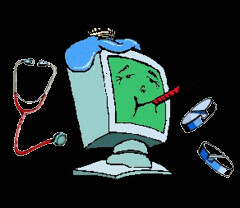 If you use the internet, you have probably been infected with a virus, trojan or spyware. According to the SANS Internet Storm Center, the average unprotected PC is infected within 20 minutes of normal internet usage. Many people want to know what they did to get infected. Unfortunately, usually it was just one wrong click.
If you use the internet, you have probably been infected with a virus, trojan or spyware. According to the SANS Internet Storm Center, the average unprotected PC is infected within 20 minutes of normal internet usage. Many people want to know what they did to get infected. Unfortunately, usually it was just one wrong click.
Here are the top reasons people get infected and how to prevent these common internet security threats.
10. Exchanging files in chat rooms.
You should never download files from sources you don't trust. Viruses and other internet security threats can look like valid files or photos. Always scan files with a virus scanner before opening them.
9. Clicking on popup ads.
If you're like most people, you probably don't like popup ads. But whether you like them or not, you should never click on them. Popup ads can take you to a website that secretly downloads adware onto your computer. Enabling a popup blocker on your computer can help protect you. Some popups come from adware programs that have downloaded onto your computer, so if you still see popups after installing a popup blocker, scan your computer for spyware or adware.
8. Email attachments.
Viruses can be sent out as email attachments to infect your computer if you open them. If you download your email into an email program, scan all email attachments with a virus scanner. Most major webmail programs scan attachments before you download them, but you should still not download files from unknown sources. "Phishing" email, claiming to be from your bank or other financial institution which asks you to provide personal information or download something to your computer is another common email threat.
7. Instant messaging.
Because people are cautious with email attachments, new viruses are spreading through instant messaging programs. Infections look like valid files or photos, so always be careful accepting file transfers, even from sources you trust.
6. Downloading music.
Many websites that advertise free music downloads are loaded with spyware. You can even get spyware from these websites without manually starting a download. Other sites make you accept a spyware download to get the music you want.
5. Browsing websites.
Some websites use "drive-by downloads" - misleading dialogue boxes to secretly install spyware programs. Sometimes spyware can install even if you do not choose "yes" or "accept". Keep your browser security settings on default to protect yourself against these infections.
4. Installing free programs or screen savers.
Check the license agreement of any program you install to confirm it does not come bundled with other programs. License agreements are supposed to explain if the software you are downloading will cause advertisements or other downloads. These programs may have long or confusing license agreements where they have buried this information. Always carefully read what you agree to before you download free software.
3. Adult-related websites.
Many of these sites make a profit by forcing viewers to download spyware and adware to access their site. You may not be able to view these sites if you are using a secure browser or have your security settings too high.
2. P2P programs like Kazaa or Limewire.
If you share music using peer-to-peer networks, you may be forced to download advertising software onto your computer. This software can generate popups from within your computer. In these cases, you may see popups even if you are not online.
1. Gaming websites.
It may seem that viewing spoilers for online games will let you win faster, but it can slow down your computer with spyware. Mick Lathrop, part of StopSign's Spyware Research team says, "I get most of my spyware samples from gaming-related websites." Avoid any site that requires a software download to access information.
Even if you have an anti-virus product on your computer, confirm that it protects against the growing threat of spyware. Enable a popup blocker and firewall for further protection. Using safe browsing habits and good security software can keep you safe on the internet.
Marla Porter is part of the Product Development Team at eAcceleration Corp., the makers of StopSign anti-virus and spyware remover. StopSign detects and removes viruses, trojans, spyware, worms, keyloggers and browser hijackers. Learn more about StopSign at http://www.stopsign.com. StopSign is a product of eAcceleration Corp: http://www.eacceleration.com.